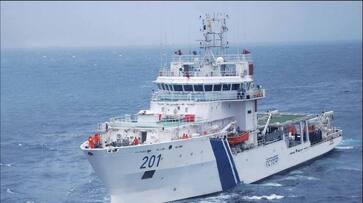The interim Indian Coast Guard was established on February 1, 1977, to prevent sea-borne smuggling of goods, which were hampering India’s domestic economy
New Delhi: The ICG (ICG) that has played an important role in safeguarding Indian strategic assets along the coastline is celebrating its foundation day on February 1. The ICG is an armed force of India that protects maritime interests and enforces maritime law, with jurisdiction over the territorial waters of India.
The interim ICG was established on February 1, 1977, to prevent sea-borne smuggling of goods, which were hampering India’s domestic economy. The ICG works in close coordination with Indian Navy, local police and the customs to safeguard the country’s economic and strategic interests.
However, like other defence forces, the lack of timely upgrade and modernisation continues to haunt it. After the 26/11 Mumbai attacks in 2008, the Centre initiated a modernisation and expansion plan under which the force aims to have 150 ships and 100 twin-engine aircraft by 2020 in its fleet. With the growing threats from the neighbouring countries, the force needs to modernise to meet the challenges.
Five operations carried by ICG recently
1. June 2018: A domestic merchant vessel named MV SSL Kolkata caught fire on June 14 with 22 crew members onboard. Rescue operations were initiated by the ICG ships and all the 22 crew members of the merchant vessel were rescued. The fire on the ship spread rapidly because of the rough seas and strong winds and soon engulfed 70 per cent of the vessel. It was an explosion that triggered the fire on the ship on June 13. The merchant vessel SSL Kolkata belonged to a Logistics firm known as Shreyas Shipping & Logistics. It was on its way Krishnapattinam to Kolkata when the incident took place.
2. July 2017: The ICG recovered 1,500 kg of heroin worth around Rs 3,500 crore from a merchant vessel seized off the coast of Gujarat. Eight crew members — all Indians — were taken into custody. The Panama-registered ship, named MV Hennery, was seized after a three-day operation based on intelligence inputs. In a biggest ever haul of narcotics drugs, transported through sea routes in recent times, the ICG ships Samudra Pavak and Ankit intercepted and apprehended a merchant vessel off the coast of Gujarat based on intelligence input. The ship was coming from Iran and was bound for Alang in Gujarat. Conversation among the crew members picked up by intelligence agencies revealed the plan was to sneak heroin into the country via Alang.
3. August 2018: Nobody can forget videos and images of rescue operation carried by the ICG from flooded areas in Kerala. Stranded people were rescued using choppers in flood-affected areas of Kerala. The southern state was hit by the most devastating floods in which hundreds lost their lives. The ICG rescued thousands of people to safer locations.
4. August 2018: The ICG personnel rescued 343 people from a passenger ship that requested for help after it reported flooding on-board the vessel while it was docked off the Car Nicobar Islands. The ICG diverted one of its ships to the site and deployed a Dornier aircraft to aid the rescue mission. The force conducted a “de-flooding and damage control” operation with heavy duty submersible pumps. The ship had left Port Blair, South Andaman for Nancowry Island. The vessel had 250 passengers, 93 crewmembers and containerized cargo on board. During the voyage, the flooding started in the hold, and the water increased to 5 m.
5. December 2018: The ICG rescues more than 500 stranded tourists from resorts in Havelock and Neil islands in the Andaman and Nicobar Islands. The tourists were stranded there for two days due to bad weather conditions following Cyclone Phethai. Coast guard ships rescued tourists from Neil islands and brought them to Port Blair, capital of the Andaman and Nicobar Islands, located some 1,400 km south-east of Chennai. The tourists were stranded at the resorts as private and government ferries, and ships could not ply to the Havelock and Neil islands due to inclement weather.
A few interesting facts about ICG
1. The setting up of ICG was first proposed by the Indian Navy to provide non-military maritime services like controlling sea-borne smuggling and other illegal activities in the Indian waters.
2. An interim ICG came into existence on February 1, 1977, with two small corvettes and five patrol boats borrowed from Indian Navy.
3. Initially, the recommendations were made to put the ICG under Ministry of Home Affairs but then Prime Minister Indira Gandhi accepted the recommendation of the Rustamji Committee and placed it under the Ministry of Defence.
4. Unlike their counterparts in the three military services, the ICG personnel can serve up to the age of 60.
The ICG is headed by a Director General (DG ICG). Vice Admiral VA Kamath was appointed the founding director general. The current Director General of ICG is Rajendra Singh.
Last Updated Feb 1, 2019, 2:35 PM IST









![Salman Khan sets stage on fire for Anant Ambani, Radhika Merchant pre-wedding festivities [WATCH] ATG](https://static-gi.asianetnews.com/images/01hr1hh8y86gvb4kbqgnyhc0w0/whatsapp-image-2024-03-03-at-12-24-37-pm_100x60xt.jpg)
![Pregnant Deepika Padukone dances with Ranveer Singh at Anant Ambani, Radhika Merchant pre-wedding bash [WATCH] ATG](https://static-gi.asianetnews.com/images/01hr1ffyd3nzqzgm6ba0k87vr8/whatsapp-image-2024-03-03-at-11-45-35-am_100x60xt.jpg)


